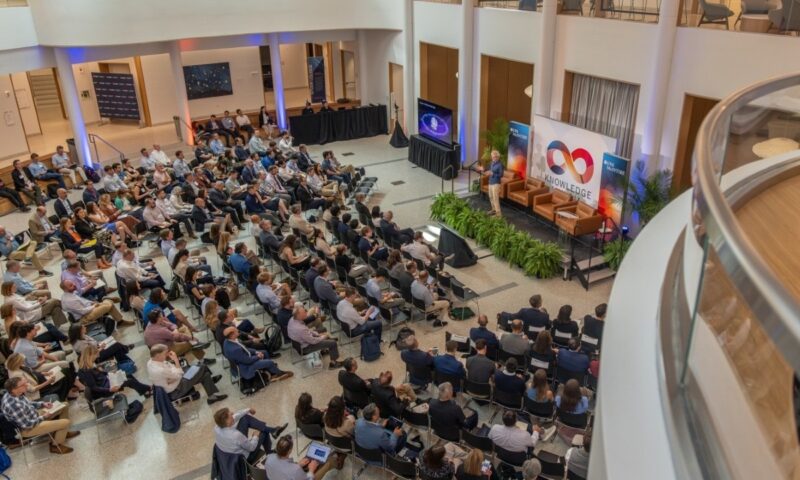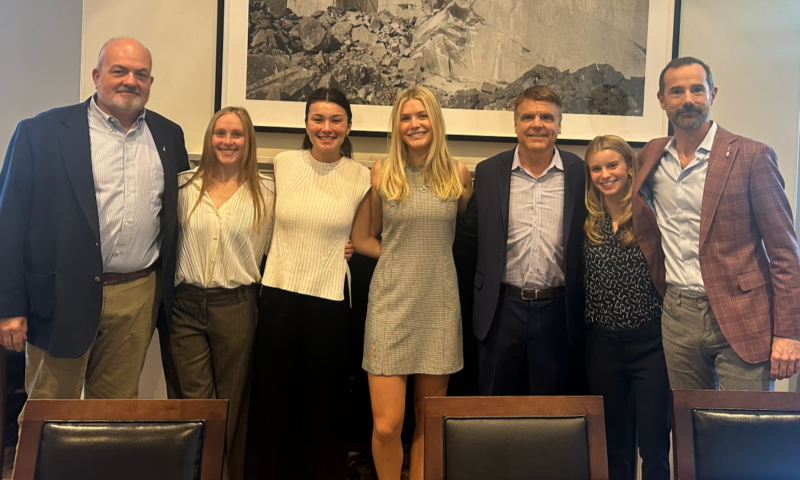This Centennial Year, we honor our past, present, and future. This article was originally published in CommerceUVA magazine in fall 2008. Nicole Iden (M.S. in MIT ’07) is Vice President, Enterprise Customer Platforms, at Capital One; Don King (McIntire ’62) is Founder and Director of Expedition Trust Company; Greg Ledford (McIntire ’79) retired from The Carlyle Group as Managing Director.
There’s an old saying that “to teach is to learn.” Did you find that to be true?
Iden: I learned that teaching is really challenging! I think I always knew that, but I definitely gained more respect for my professors, who do this day in and day out for hours. You’re up there on display for everyone, and no matter how much you know a subject, even if it’s something you’ve been doing for years, students will always surprise you. You think, “Oh, I could do this with my eyes closed”—but then you get one question out of the blue that really opens your eyes to a new perspective. It’s challenging, but I think it’s fantastic.
There’s another thing, too: Getting in front of people and explaining what you do, and how you’ve taken what you’ve learned and applied it practically, really forces you to get rid of the background noise and figure out what’s critical. It really helps to crystallize your thinking.
Ledford: For me, teaching really did offer an opportunity to learn. I had to be able to discuss how private equity interacts with the overall industry both domestically and internationally, and I don’t have as much experience in international private equity. So I had to really think about how private equity fits in with other asset classes, and I also had to do some research to get up-to-date on various facts, figures, and trends. I wanted to make sure I was teaching and not just telling war stories. It was a little bit of a shakedown going into it, but in the end I think it was pretty successful.
King: Teaching with George Overstreet was great—it was George the academic and me the practitioner coming at the students from two different points of view. In class, we gave each other permission to disagree pretty strongly with one another. I might take George on over the practical application of knowledge; then he’d turn around and scold me for not being rigorous enough with the academic part. I think students come away with a respect for the theory, but also see that often the way things get done in the market is different from the way they’re taught in the academy. But one thing I really learned is the relevance of some of the theoretical stuff that I used to pooh-pooh a bit. Frankly, getting down and working through those theories taught me some things.
But some of the best lessons come from the students—the amount of studying and work they put in, and hearing how they look at the world. I also learned that the students have a very strong moral sense, which I think comes from their four years with the honor system. I think we’re training people to go out into business and government and be stand-up, moral people. I like that—and it’s another reason for doing what I’m doing.
None of you are teachers by profession. Were you at all nervous about teaching?
Ledford: I worked with Professors Marston and Wilhelm on the syllabus, but I was in charge of all the content, and it was my responsibility to teach or to use my Rolodex to bring someone in to teach a specific topic. To be honest, I was a little scared after agreeing to it: A two-and-a-half-hour class once a week requires a lot of talking and preparation. I wanted to be sure that I didn’t bore the students to tears.
I got a lot of support from Professors Marston and Wilhelm, as well as from other alumni. I think there might be only one other private equity class in the world taught to undergraduates—so we really didn’t have a model, and of course, there’s no textbook. It was week by week, writing PowerPoint presentations or case studies or whatever we needed to do to present the subjects and topics. So, it was a little daunting. It’s one thing to know a topic; it’s another to teach it. I wanted to make sure that I could convey what I wanted to the students.
King: I wasn’t intimidated by getting in front of a group of students because I’ve been working in this area for so long. But I think the intimidating part was—after I’d been teaching for a while—saying to myself, “Am I doing as good a job as I could be?” I really wanted to create sparks in the students’ minds. I also wished we had more time. We had to skip over some things, and I thought that might be daunting for the kids. But they pick up so much. When you look at the final exam, you realize that they’ve learned an awful lot in 14 classes. It’s a great feeling.
What did you find most surprising about teaching?
Iden: I was totally blown away by how interested the class was in the industry I’m working in. (The Grameen Foundation supports microfinance institutions around the world, helping the poor to lift themselves out of poverty.) Often in subjects like business or IT we tend to think, “Well, after this degree I’ll go work on Wall Street or in an IT development shop or as an investment banker.” But after the class, I had a line of people who wanted to learn about my organization and some of the work we do. I ran out of time because I had to catch a flight to Ghana. For me, that interest was definitely the highlight of the day.
Ledford: I don’t know if I would say I was surprised, but I was relieved by the students’ phenomenal energy level and desire to learn. There were some Monday nights when I really wasn’t looking forward to driving three hours to Charlottesville, teaching for two and a half hours, then driving three hours back. But as soon as I walked in the classroom, I was refreshed and energized. Many classes, except for the one before the North Carolina basketball game, ran over the two and a half hours because the students just had more questions. The interaction was so great—I thought they’d be looking at their watches, ready to run out of there at 6 p.m.
What you see in teaching at McIntire is that it’s very difficult to get into the University, and then into the Comm School. So you’re getting the cream of the crop. It’s not just how smart they are; it’s how hard they’re willing to work. That was very evident.
King: I was also impressed by the students’ preparation and the great questions they asked. We used real-world examples—investment committee books, disguised slightly, that my company used to make $30, $40, $50 million investments on behalf of our clients. The students were put in the position of either the acquisition person or an investment committee member. They basically had to say why they thought a property should be approved by an investment committee, and then those on the committee had to weigh those factors and decide whether the proposed investment passed the test. We did this by the case method, trying to get as much active student participation as we could. I wasn’t sure how well that would work in an undergraduate setting. But I was very pleased. After the first couple of sessions, everyone really came forward and participated, and I think they got a lot out of it. Some of them even told me that if they’d known the real estate world was out there, they’d have tried to get a job in it, which is always gratifying for me to hear.
What did you find most rewarding about your teaching experience?
Ledford: The students really seemed to appreciate the class. Most of them had already interned and were going into investment banking or private equity. By that point, they really enjoyed having practitioners come in and talk to them. They’d heard the theory, and it was obvious from their understanding of markets that they’d been taught well. But there’s the theoretical and analytical, and then there’s your gut and what you have to do in different situations that you really can’t learn from textbooks. So I was able to share my experience with the students, which was great. Obviously, it takes time—but I would highly recommend it. It’s very rewarding.
Iden: For me, the networking piece was the best part. I mentioned that people were very interested in the Grameen Foundation; some of them I still talk to regularly. One of them even has a daughter who now comes in as a volunteer. We’re looking to figure out how we can engage the M.S. in MIT community because the community has such a wealth of knowledge, and we’re always looking for ways to funnel that into the developing world. When I was in the M.S. in MIT Program myself, 50% of what was so great about it was your classmates—and it’s the same when you come back. It’s a whole new crop of great people with different perspectives, from different industries, with different experiences. There’s such an opportunity to learn from the students.
King: George is a master at getting the students to sit down and talk to him. He’s such a great teacher, and it’s obvious that he really loves helping and mentoring. I’ve learned a lot from him, and through him I’ve gotten to do more of that sort of thing, which is some of the most rewarding part of the job. I’m still in contact with a Thai student, who first came to talk to me about the kind of job he wanted. Then he got an offer, and now he wants to talk to me about what he should be doing next. He asked me what advice I would give him if he were my son—so I told him what I’d told my own kids they should do. I think the idea of getting a phone call at 8 a.m. from someone coming home from dinner in Bangkok is remarkable. McIntire is a magical place for those kinds of experiences, I’ll say that.



